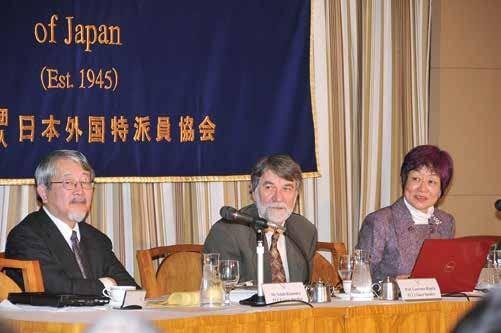Issue:

LEGAL EXPERTS BELIEVE THAT CHANGES PLANNED BY THE LDP WILL SERIOUSLY IMPACT HUMAN RIGHTS AND THE FREEDOM OF THE PRESS IN JAPAN
The Liberal Democratic Party’s plans to revise the Constitution pose a serious threat to the ability of journalists to perform their jobs and, consequently, to the concepts of free speech and a free and fair media, according to Yoichi Kitamura, representative director of the Japan Civil Liberties Union.
Kitamura appeared at the FCCJ on Feb. 21 with two law professors to consider the implications of the radical changes that are being planned for a Constitution that was promulgated in November 1946 and has not been changed since.
Prime Minister Shinzo Abe has made it clear that he intends to right a wrong the LDP believes was imposed on Japan by the Allies in the aftermath of World War II by revamping the nation’s basic law. And with a large majority in the lower house of the Diet since December’s general election and the party likely to build on the number of seats it holds in the upper house in the election for that chamber in the summer, he will be in a strong position to do precisely that.
While there is widespread concern at the erosion of human rights, the vagueness of provisions on public order and the insistence that the people “respect” the Constitution, the flag and the national anthem, the potential impact on the media also caught the attention of journalists attending the event.
Kitamura, a media law expert, flagged the planned new Article 19-2, which states, “No person shall improperly acquire, possess or use information concerning individuals.”
“This is phrased in order to impose another duty on the people, and it raises the question of whether the true intent is to use this as the basis for more government regulation of the mass media and other writers,” Kitamura said.
“The LDP is trying to introduce catch all prohibitions against collecting information,” he added. “When it applies to ‘no person, ’ that means all of us. Anyone. If it is strictly applied, all our information gathering activities will be severely restricted. I’m afraid that all activities by freelance writers and smaller media outlets could come to a halt.”
‘THE LDP IS PURPOSELY HOSTILE TO UNIVERSAL AND HISTORIC HUMAN RIGHTS.’
Kitamura pointed out that the right to privacy has not been clearly established under Japanese law, but added, “The LDP is purposely hostile to universal and historic human rights, including free speech and the freedom of the press.”
Lawrence Repeta, a professor in Meiji University’s Faculty of Law, warned that the LDP’s proposals will impact many aspects of life in Japan and the nation’s relationships with the rest of the world. “If this plan is adopted, Japan will be turning its back on the global movement toward expanded human rights protection and government accountability,” he said.
Article 97, which guarantees the fundamental human rights of all citizens, would be removed entirely, he points out. “That is a very broad statement on human rights and the LDP simply wants to delete it,” he said. “We can find no statement to support that decision in the explanatory leaflet.”
Instead, the people would be duty bound to demonstrate “respect for the national flag and national anthem” in the new Constitution.
There would also be a requirement to “never violate public order or the public interest.” Although legal experts say there is no definition of just what the public interest might be, this could provide police and the judicial authorities with wide ranging but undefined new powers.
“My guess is that their view of Japan is that it should be more like the prewar Japan of the early 1930s,” said Masako Kamiya, a law professor at Gakushuin University.
“I believe there are a number of LDP members who share the view that it was not such a bad time, that there were some good things in that era,” she added. “Society was harmonized, young people behaved themselves and respected their elders, and order was kept, as defined by the government and authorities.
“The contents of this proposal, unfortunately, include changes that seem to ignore the choices that our forebears made,” she said.
Of major concern to members of the Japan Civil Liberties Union is the apparently deliberate decision to move in a direction that is contrary to the more accepted global attitude towards human rights.
Explaining its rationale on the party website, the LDP said that “in preparing the present draft, first we thoroughly reviewed phrasing that sounds like a translation and provisions that seem to be based on the natural rights theory.
“Rights are gradually formulated through the history, tradition and culture of each community,” it states. “Therefore, we believe that the provisions concerning human rights should reflect the history, culture and tradition of Japan.
“The current Constitution includes some provisions based on the Western theory of natural rights. We believe these provisions should be revised.”
Professor Repeta says there is good reason to be worried. “It is very clear from this document that [the LDP’s] world vision is detached from the more common understanding of fundamental human rights,” he said.
“We are entering a period in which the world is more awake to the concept of human rights, but the LDP seems to be saying that they do not want to be a part of that,” he said. “Overall, this is more about government power over the people and reduced protection for individual rights.”
Kitamura summed it up rather succinctly: “Sounds like xenophobia to me.”

